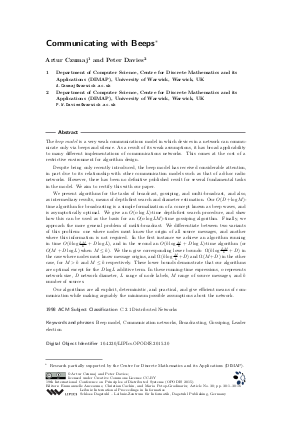Communicating with Beeps
Authors Artur Czumaj, Peter Davies
-
Part of:
Volume:
19th International Conference on Principles of Distributed Systems (OPODIS 2015)
Part of: Series: Leibniz International Proceedings in Informatics (LIPIcs)
Part of: Conference: International Conference on Principles of Distributed Systems (OPODIS) - License:
 Creative Commons Attribution 3.0 Unported license
Creative Commons Attribution 3.0 Unported license
- Publication Date: 2016-10-13
File

PDF
LIPIcs.OPODIS.2015.30.pdf
- Filesize: 447 kB
- 16 pages
Document Identifiers
Subject Classification
Keywords
- Beep model
- Communication networks
- Broadcasting
- Gossiping
- Leader election
Metrics
- Access Statistics
-
Total Accesses (updated on a weekly basis)
0Document
0Metadata
Abstract
The beep model is a very weak communications model in which devices in a network can communicate only via beeps and silence. As a result of its weak assumptions, it has broad applicability to many different implementations of communications networks. This comes at the cost of a restrictive environment for algorithm design. Despite being only recently introduced, the beep model has received considerable attention, in part due to its relationship with other communication models such as that of ad-hoc radio networks. However, there has been no definitive published result for several fundamental tasks in the model. We aim to rectify this with our paper. We present algorithms for the tasks of broadcast, gossiping, and multi-broadcast, and also, as intermediary results, means of depth-first search and diameter estimation. Our O(D+log(M)-time algorithm for broadcasting is a simple formalization of a concept known as beep waves, and is asymptotically optimal. We give an O(n*log(L))-time depth-first search procedure, and show how this can be used as the basis for an O(n*log(L*M))-time gossiping algorithm. Finally, we approach the more general problem of multi-broadcast. We differentiate between two variants of this problem: one where nodes must know the origin of all source messages, and another where this information is not required. In the first instance we achieve an algorithm running in time O(k*log((L*M)/k)+D*log(L)), and in the second an O(k*log(M/k)+D*log(L))-time algorithm (or O(M+D*log(L)) when M <= k). We then give corresponding lower bounds: Omega(k*log((L*M)/k)+D) in the case where nodes must know message origins, and Omega(k*log(M/k)+D) and Omega(M+D) in the other case, for M > k and M <= k respectively. These lower bounds demonstrate that our algorithms are optimal except for the D*log(L) additive term. In these running-time expressions, n represents network size, D network diameter, L range of node labels, M range of source messages, and k number of sources. Our algorithms are all explicit, deterministic, and practical, and give efficient means of communication while making arguably the minimum possible assumptions about the network.
Cite As Get BibTex
Artur Czumaj and Peter Davies. Communicating with Beeps. In 19th International Conference on Principles of Distributed Systems (OPODIS 2015). Leibniz International Proceedings in Informatics (LIPIcs), Volume 46, pp. 30:1-30:16, Schloss Dagstuhl – Leibniz-Zentrum für Informatik (2016)
https://doi.org/10.4230/LIPIcs.OPODIS.2015.30
BibTex
@InProceedings{czumaj_et_al:LIPIcs.OPODIS.2015.30,
author = {Czumaj, Artur and Davies, Peter},
title = {{Communicating with Beeps}},
booktitle = {19th International Conference on Principles of Distributed Systems (OPODIS 2015)},
pages = {30:1--30:16},
series = {Leibniz International Proceedings in Informatics (LIPIcs)},
ISBN = {978-3-939897-98-9},
ISSN = {1868-8969},
year = {2016},
volume = {46},
editor = {Anceaume, Emmanuelle and Cachin, Christian and Potop-Butucaru, Maria},
publisher = {Schloss Dagstuhl -- Leibniz-Zentrum f{\"u}r Informatik},
address = {Dagstuhl, Germany},
URL = {https://drops.dagstuhl.de/entities/document/10.4230/LIPIcs.OPODIS.2015.30},
URN = {urn:nbn:de:0030-drops-66195},
doi = {10.4230/LIPIcs.OPODIS.2015.30},
annote = {Keywords: Beep model, Communication networks, Broadcasting, Gossiping, Leader election}
}
Author Details
References
-
Y. Afek, N. Alon, Z. Bar-Joseph, A. Cornejo, B. Haeupler, and F. Kuhn. Beeping a maximal independent set. In Proceedings of the 25th International Symposium on Distributed Computing (DISC), pages 32-50, 2011.

-
M. Chrobak, L. Gąsieniec, and W. Rytter. Fast broadcasting and gossiping in radio networks. Journal of Algorithms, 43(2):177-189, 2002.

-
A. Cornejo and F. Kuhn. Deploying wireless networks with beeps. In Proceedings of the 24th International Symposium on Distributed Computing (DISC), pages 148-262, 2010.

-
K.-T. Förster, J. Seidel, and R. Wattenhofer. Deterministic leader election in multi-hop beeping networks. In Proceedings of the 28th International Symposium on Distributed Computing (DISC), pages 212-226, 2014.

-
M. Ghaffari, B. Haeupler, , and M. Khabbazian. Randomized broadcast in radio networks with collision detection. In Proceedings of the 32nd Annual ACM Symposium on Principles of Distributed Computing (PODC), pages 325-334, 2013.

-
M. Ghaffari and B. Haeupler. Near optimal leader election in multi-hop radio networks. In Proceedings of the 24th Annual ACM-SIAM Symposium on Discrete Algorithms (SODA), pages 748-766, 2013.

-
S. Gilbert and C. Newport. The computational power of beeps. In Proceedings of the 29th International Symposium on Distributed Computing (DISC), pages 31-46, 2015.

-
K. Hounkanli and A. Pelc. Deterministic broadcasting and gossiping with beeps. In arxiv 1508.06460, 2015.

-
D. Peleg. Time-efficient broadcasting in radio networks: A review. In Proceedings of the 4th International Conference on Distributed Computing and Internet Technology (ICDCIT), pages 1-18, 2007.

